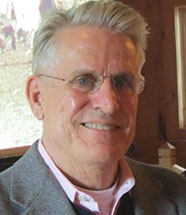Q&A: A Closer View of the Coup Attempt and its Aftermath in Turkey
History of Art Professor Robert Ousterhout, currently overseas, answers our questions.
Welcome to OMNIA Q&A, where we speak with leading experts about the latest issues and research.
Robert Ousterhout has been researching in Turkey for 37 years. The art history professor documents and interprets the vanishing architectural heritage of the eastern Mediterranean, particularly the architecture, monumental art, and urbanism of Constantinople and Cappadocia. He was there on June 28, when the Atatürk Airport in Istanbul was bombed. Ousterhout spoke to us from Greece about the military’s attempted coup and its aftermath and the implications for scholarship in Turkey and internationally.
You were in Turkey earlier this summer. What was the atmosphere like?
I was in Turkey in June for professional meetings in Istanbul followed by a week of research in Cappadocia in central Turkey. Istanbul was eerily quiet, in part because tourism is way down, but also because locals are not going out or are avoiding popular areas, like Istiklal Caddesi or Taksim Square. In Cappadocia, there was virtually no tourism—hotels were empty or closed. Several friends there were speaking hopefully about things picking up after Ramadan. Then the Istanbul airport was bombed, and the cancellations started coming in. I don’t expect the tourist industry to recover any time soon.
Why do you think the coup attempt happened now? Did anyone see it coming?
No one saw the coup attempt coming, and no one wanted it, as the response indicated. But it was badly planned and badly executed, leading many to wonder if it was intended to fail, for whatever reason.
What have the results of the coup’s failure been?
Things remain pretty tense. Turks can be very nationalistic, even if they don’t support the current government, so discussion of recent events can allow tempers to flare. As many feared, the immediate result is a veritable witch hunt, as the government cracks down on its enemies, real and imagined. Freedom of speech and freedom of the press, already seriously compromised, are under further pressure.
We are all also hoping that the suspected mastermind of the coup, Fetullah Gülen, who is always referred to (unnamed) as “the cleric from Pennsylvania,” is not confused with a certain university of the same name. Recent headlines in the Turkish press proclaim, “Turkey will not be ruled by Pennsylvania!"
What is happening with university personnel there?
The impact of all of this on the educational system in general is devastating. The figures are horrifying: 21,000 school teachers fired, 15,000 educational bureaucrats, and more than 1,500 university deans asked to resign. The system cannot easily recover from that many losses. Who will replace them? Many fear the government will insert its own people to keep the educational system under its control.
In addition, Turkish academics have been banned from travel for the immediate future. For those whose research depends on international travel, this is a real blow. One example: the International Congress of Byzantine Studies, which happens every five years with an attendance of around 4,000 specialists, will meet in Belgrade in August. The Turkish National Committee will not be represented. They had prepared a proposal for holding the next congress in Istanbul, which would have been really great, because the field of study has really developed there over the last decade. Now that won’t happen, and many outside Turkey will think twice about participating in any academic program of any sort anywhere in Turkey. This means Turkish academics will be increasingly isolated.
What do you see as the future for programs like your summer school in Turkey?
For the last five years I’ve run a summer field school in Cappadocia for graduate students in Byzantine Studies from around the world. We went on hiatus this year because of Ramadan (the Muslim holy month). Now, with the collapse of the tourist industry, we've lost our local support base, and it will be increasingly difficult to attract international students. This may be the end of it. I also worry about what this means for Penn’s archaeology program. Penn has been digging in Turkey since the 1950s, and the excavation at Gordion has been an important training ground for our students.
What do you think this means as far as Turkey’s international role?
I don’t think Turkey will continue to seek EU membership, and its role in NATO remains problematic. It’s hard to say where its allegiances are. The European-oriented reforms of recent years are not important to Erdoğan’s power base.
With your long history of research in Turkey, what has it been like for you to watch this?
It’s been devastating to watch. While the monuments that have been the focus of my research all lie in Turkey, I can pack up and go elsewhere; my Turkish colleagues don’t have that luxury. Nor do the monuments. I first went to Turkey in the late 1970s, and I was there during the Iranian revolution. Everyone said at that time, “This could never happen in Turkey.” Watching the current government’s mobilization of Islam to political ends, its systematic elimination of all rivals, its challenges to free speech, its control of the media and the educational system, its distrust of academics, its rewriting of history, its reopening of Byzantine churches as mosques ... well, I now have my doubts. Turkey has become a very different—and a less welcoming—country in the last 20 years.



